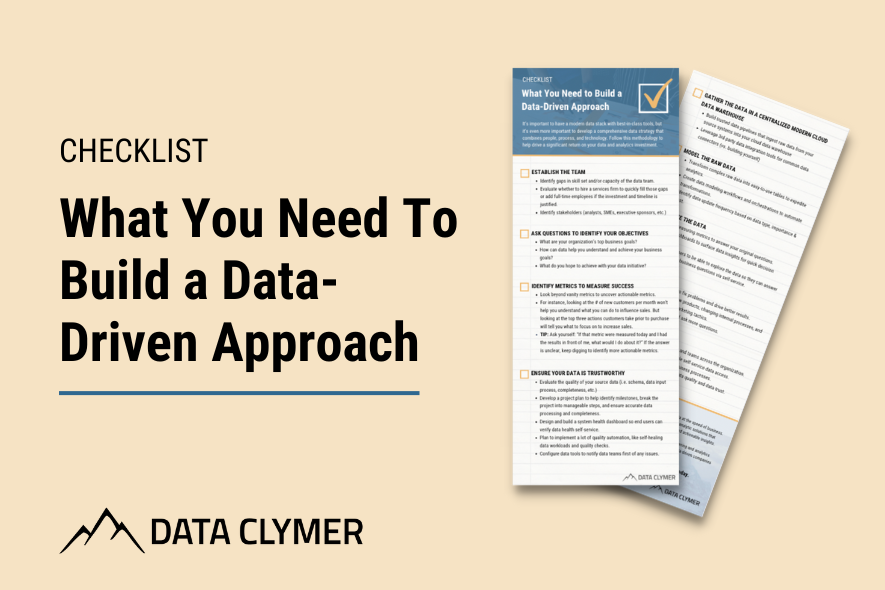As data leaders, it’s common to feel overwhelmed and stressed by the long list of responsibilities that come with the job. We face pressure to make data-driven decisions, hire and manage teams, prove ROI to stakeholders, and meet pressing deadlines. And depending on how large your team is, you might still need to jump in to do hands-on work like building a dashboard, coding, or delivering an analysis.
All of this can take a toll on your well-being and productivity.
But reducing stress is possible—and it might be easier than you think. In this blog post, I’ll share six simple strategies to help data leaders master their mindset, reclaim their time, and prioritize their well-being. Try adopting some of these practices today and see if they help you achieve better balance and focus.
1: Plan your morning the night before.
![]() Most of us are most productive in the morning hours, so set yourself up for success right out of the gate.
Most of us are most productive in the morning hours, so set yourself up for success right out of the gate.
Do your homework the night before and note 2-3 high-priority tasks to focus on when you get to work. Protect your most valuable time: Do these tasks BEFORE you check Slack, email, etc. Those communications will still be there when you get these tasks completed.
Then, ride the wave of productivity. Starting your day off with a quick hit of productivity can set you up for later success by making you feel accomplished and focused.
2: Cut back on (unnecessary) meetings.
![]() Do you ever find yourself in a meeting wondering why you’re there or multitasking because the meeting isn’t engaging? Remember: with great meeting power comes great meeting responsibility. While meetings can be valuable, they can become a productivity drain if they’re not carefully planned and executed.
Do you ever find yourself in a meeting wondering why you’re there or multitasking because the meeting isn’t engaging? Remember: with great meeting power comes great meeting responsibility. While meetings can be valuable, they can become a productivity drain if they’re not carefully planned and executed.
To minimize/maximize meetings, try the following tips (and encourage your team to do the same).
- Set clear objectives. Provide a clear objective and agenda when scheduling a meeting to ensure the meeting is necessary and focused.
- Consider alternative formats. Some meetings can be replaced by voice memos or pre-recorded videos for updates and information.
- Do your pre-work. Share documents or presentation slides before the meeting to allow attendees to review them and prepare questions. This cuts down on time spent establishing context during the meeting.
- Limit attendees. Invite only those necessary to keep the meeting focused and productive. If you can’t tell what role you’re playing in a meeting, ask! Do not be afraid to decline the invitation if you’re not needed.
- Remember the importance of meeting notes and follow-up. Momentum is gained by assigning ownership and setting a clear deadline, not just defaulting to “by the next meeting.”
Meetings can be important for collaboration and communication, but they can drain productivity if not managed effectively. By implementing these strategies, you can reclaim time and focus on what matters most.
3: Block an hour on Fridays to review your week.
![]() As the weekend approaches, it’s a great time to take a moment to review your week and prepare for the next. Recapping your week can help you celebrate your successes, identify areas where you can improve, and set goals for the future.
As the weekend approaches, it’s a great time to take a moment to review your week and prepare for the next. Recapping your week can help you celebrate your successes, identify areas where you can improve, and set goals for the future.
As you look back on the past week, consider the following questions:
- What was your biggest accomplishment?
- What challenges did you face, and how did you overcome them?
- What did you learn?
- What goals did you achieve, and where did you fall short?
- What can you do differently next week to improve?
When we’re busy, it’s very easy to gloss past the good things and just move on while the bad things nag at us. Taking a few moments to reflect on your week and celebrate your accomplishments can set you up for success.
4: Make a mistake.
“Give yourself permission to be bad.” —Seth Godin, The Practice: Shipping Creative Work
We often hold ourselves back from learning and growing because we’re afraid of looking foolish. Whether we’re trying to learn a new programming language, public speaking, or any other skill, we tend to avoid taking risks and making mistakes to protect our egos.
But as Godin notes, this mindset can prevent us from truly mastering a skill. Mastery is not just about doing what we’re already good at, but also about pushing ourselves outside of our comfort zone and embracing the discomfort of trying something new. We need to be willing to make mistakes and learn from them to become truly great at something. Remember, failure is only a failure when we’re not learning and adapting.
So if you’re trying to develop a new skill, remember to give yourself permission to make mistakes and to fail. Don’t be afraid of failure or looking foolish in the short-term, because those are just the necessary steps on the path to mastery. Embracing the discomfort of learning and growth is key to success.
5: Acknowledge and overcome imposter syndrome.
![]() As professionals, many of us have experienced imposter syndrome at some point in our careers. Some of us even struggle with it daily and it can keep us from reaching our full potential. But there are ways to combat imposter syndrome and overcome it.
As professionals, many of us have experienced imposter syndrome at some point in our careers. Some of us even struggle with it daily and it can keep us from reaching our full potential. But there are ways to combat imposter syndrome and overcome it.
Here are a few tips I’ve found helpful:
- Acknowledge and accept your feelings. Recognize that imposter syndrome is a common experience and that even successful people have faced it. Accept that it is okay to feel this way and that it doesn’t define your abilities.
- Identify your strengths and achievements. Make a list of your accomplishments and positive feedback you’ve received from colleagues, clients, and managers. Recognize your unique skills and talents and give credit for your hard work.
- Connect with others. Seek guidance, feedback, and support from colleagues or mentors. Join professional groups or attend networking events to connect with like-minded individuals who can relate to your experiences. Seek out learning opportunities to develop new skills and knowledge.
- Challenge negative self-talk. Recognize and challenge the negative thoughts and beliefs that trigger imposter syndrome. Replace them with positive affirmations and remind yourself of your successes.
6: Prioritize balance and well-being.
![]() Someone recently asked me about two habits I’d like to do more consistently in my professional life. Initially, my answers were focused on efficiency and productivity, but after some reflection, I realized that I also need to prioritize balance and well-being.
Someone recently asked me about two habits I’d like to do more consistently in my professional life. Initially, my answers were focused on efficiency and productivity, but after some reflection, I realized that I also need to prioritize balance and well-being.
It’s easy to get caught up in the hustle and bustle of our careers, but it’s important to remember that it’s a marathon, not a sprint. Take the time to pause and reassess your habits to ensure that you’re taking care of yourself and your family while still achieving your professional goals.
Cultivate positive habits and relationships to help you navigate the busy seasons of work and provide support through your personal and professional journey.
Mind Over Matter: Practice Makes Perfect
Every job is stressful at times, and being a data leader is no exception. Taking the time to build strong habits and cultivate positivity can have a profound impact on our lives, both professionally and personally. With the right mindset, it’s easier to cope with difficult situations, build strong relationships, and achieve goals.
It’s worth noting that these tips aren’t just for data leaders: they can be helpful for any data professional, or any person for that matter. If any of them resonated with you, I encourage you to share them with your team and remind them to take care of their well-being.
Here’s to de-stressing and achieving balance in 2023!
Want more like this?
Follow me on LinkedIn for more leadership and productivity tips or subscribe to receive the latest data insights from the Data Clymer team.

About the Author
Jason Moffett
As VP of Delivery, Jason helps define and execute Data Clymer’s strategic vision and oversees the delivery of efficient and effective data solutions to clients. He leads a team of data engineers, data analysts, and engagement managers to deliver an end-to-end data project lifecycle that delights customers and helps them establish a thriving data-driven culture.





